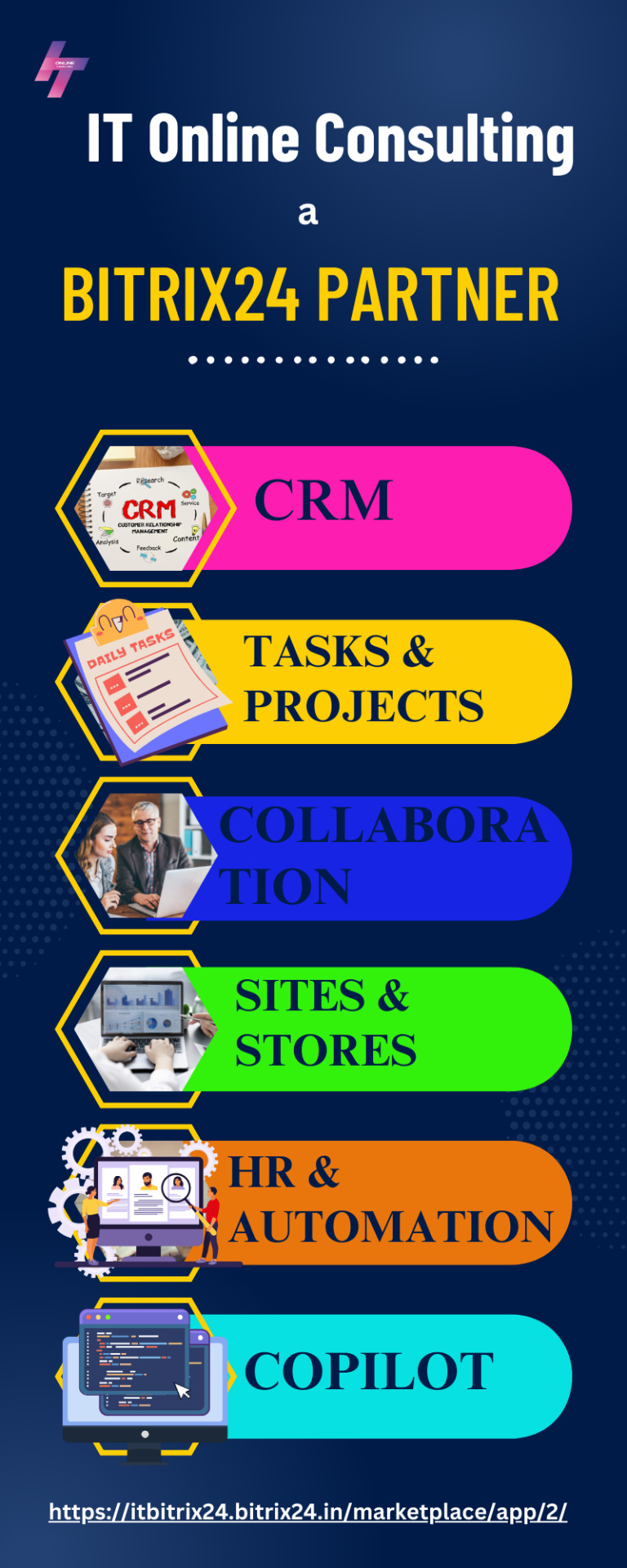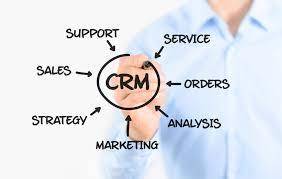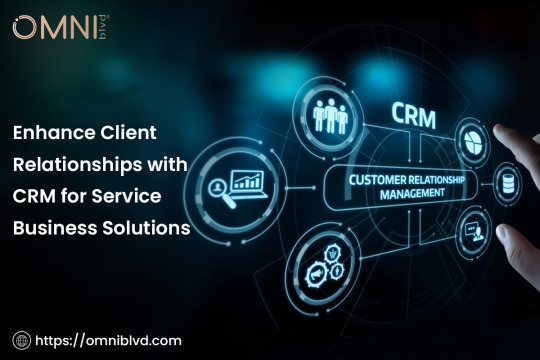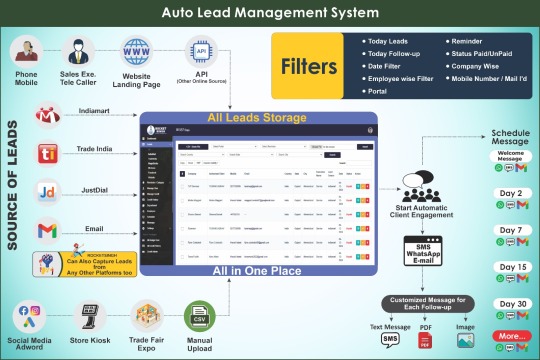#crm in marketing management
Explore tagged Tumblr posts
Text
Social CRM: Engaging Customers Across Platforms for Better Relationships
In today’s digital landscape, where consumers engage with brands across various social channels, the importance of Social Customer Relationship Management (Social CRM) cannot be overstated. By effectively utilizing Social CRM strategies, businesses can foster deeper relationships with customers, enhance engagement, and drive loyalty, all while navigating the complexities of multiple platforms.…
#best practices for brand management#Branding strategies for small businesses#building brand loyalty#business growth strategies#corporate social responsibility#creating a strong brand identity#CRM#customer relationship management#Customers#digital marketing for startups#e-commerce tips for businesses#Engaging#how to scale your business.#how to start a successful business#importance of social media for businesses#influencer marketing for brands#Platforms#Relationships#small business funding options#Social#top business trends 2024
2 notes
·
View notes
Text

IT Online Consulting - Your Trusted Bitrix24 Partner.
Proud Bitrix24 partner, we specialize in CRM integration, workflow automation, and boosting team collaboration. Let us help you unlock your business potential with tailored Bitrix24 solutions.
Visit IT Online Consulting and start your journey to success today!
#crm#bitrix24#automation#hr management#marketing#stores#sites#businesstransformation#teamcollaboration#crmsolutions
3 notes
·
View notes
Text
Maximizing Customer Relationship Management in the Trucking Industry
Enjoy the latest blog post from FRC - learn why a reliable CRM is worth its weight in gold!
Introduction to Effective CRM Strategies for Trucking Businesses In the fast-paced world of trucking and logistics, maintaining strong customer relationships is the cornerstone of success. For trucking business owners, leveraging Customer Relationship Management (CRM) tools can transform operational efficiency and elevate customer satisfaction. This article looks into the strategic…

View On WordPress
2 notes
·
View notes
Text
Marketing Officer Opportunity at Midlands State University - February 2025
Midlands State University (MSU) is seeking a driven and experienced Marketing Officer to join their team. This role offers a fantastic opportunity to shape the university’s marketing strategy and contribute to its growth. About the Role: The Marketing Officer will be responsible for developing and executing comprehensive marketing plans to attract students, enhance the university’s brand, and…

View On WordPress
#Brand Management#business#CRM#Digital Marketing Jobs#digital-marketing#education#Employment ZW#Enrollment Marketing#Gweru Jobs#Higher Education Jobs#Higher Education Marketing#Job Opportunities ZW#Job Search ZW#jobs#Lead Generation#Marketing#Marketing Analytics#Marketing Jobs#Marketing Manager#Marketing Officer#Marketing Strategy#Midlands State University#msu#SEM#SEO#Social Media Marketing#University Jobs#University Marketing#Zim Jobs#Zimbabwe Careers
0 notes
Text
Websofy - Smart Software for Smart Businesses

Looking for reliable software development in Lucknow? Websofy Software Pvt Ltd creates powerful custom solutions to help businesses streamline operations and maximize productivity. Contact us for top-tier software services! Call us now! > Contact No. : +91-9335785354 > Location: https://maps.app.goo.gl/hTCSSbWTN4KqoLZ5A > Website: https://www.websofy.com/software-development-company/
#software#software development#digital marketing#crm software#mlm software#HMS#payroll management#inventory management
0 notes
Text
youtube
Empower your Real Estate Business with Our Cloud Telephony IVR Solution. It helps you manage all your business lead capture/ assignment, Auto dialer, smart automated followups, detailed employee tracking, and call recording in a single dashboard.
#crm#marketing#business#dynamics#management#technology#ecommerce#software#dashboard#erp#adminpanel#digitalmarketing#Youtube
0 notes
Text
Behind the Code: Open Source CRM Development Unveiled
0 notes
Text

Zoho SalesInbox: The Ultimate Email Solution for Sales Teams
If you’re in sales, you already know how messy emails can get. You’re constantly juggling leads, deals, and follow-ups, and before you know it, important conversations get buried under a pile of unread messages.
That’s where Zoho SalesInbox steps in—a sales-focused email client that integrates directly with Zoho CRM, ensuring that your inbox is organized, efficient, and built for closing deals.
Let’s dive deep into how Zoho SalesInbox can revolutionize the way you manage sales emails.
What is Zoho SalesInbox & Why Do You Need It?

Imagine an email inbox that automatically sorts messages based on deal stages, lead priority, and client history—without you lifting a finger. Zoho SalesInbox does exactly that.
Unlike regular email clients (like Gmail or Outlook), this tool is built specifically for sales teams, so you’re always looking at the emails that matter the most.
Key Benefits at a Glance
Prioritized Emails – See the most critical emails (hot leads, pending deals) first.
CRM-Powered Insights – Every email is linked with your Zoho CRM, so you never lose track of a conversation.
One-Click Actions – Move emails into different deal stages with simple drag-and-drop functionality.
Smart Follow-Ups – Get automatic reminders when a lead hasn’t replied to your email.
Deep Analytics – Track email open rates, response times, and engagement for every prospect.
Top Features That Make Zoho SalesInbox a Must-Have

Quick Tip:
Leverage the expertise of Zoho Experts and Zoho Consultants to drive 3x business growth and efficiency by maximizing the potential of Zoho SalesInbox.
1. Automatic Email Sorting (No More Inbox Clutter)
Zoho SalesInbox organizes your emails into four key columns:
Deals – Emails from leads you’re actively working on.
Contacts – Messages from existing customers.
Leads – Potential clients you haven’t converted yet.
Colleagues – Internal team communications.
No more digging through endless emails to find that one prospect’s response. Everything is sorted in real-time, keeping you focused on what matters most—closing deals.
2. Full CRM Integration (All the Info You Need in One Place)
Every email in Zoho SalesInbox comes with contextual CRM data attached. When a prospect emails you, you’ll instantly see:
Their name & company details
Deal status & pipeline stage
Previous email conversations
Notes & follow-ups
This means you never have to search through old emails or CRM records to remember where things left off. It’s all right there inside your inbox.
3. One-Click CRM Updates (No More Manual Data Entry)
Instead of switching between your email and CRM, Zoho SalesInbox lets you perform key actions without leaving your inbox:
Convert an email into a new lead or opportunity
Move an email into a deal stage
Update notes or set a follow-up task
Assign an email to a teammate
If you’re tired of manually copying and pasting customer details between apps, this feature alone makes Zoho SalesInbox worth it.
4. Follow-Up Reminders (Never Let a Deal Go Cold)
How many times have you sent a proposal and thought, I’ll follow up later—but completely forgot?
With Zoho SalesInbox’s ResponseWatch, you can set an automatic follow-up reminder if the recipient doesn’t reply within a certain timeframe.
For example:
If a lead doesn’t respond within 48 hours, you get a reminder to follow up.
If a deal is stalled for over a week, you get an alert to re-engage the prospect.
This ensures that no hot lead slips through the cracks.
5. Advanced Email Analytics (Know What’s Working)
Zoho SalesInbox also tracks how your emails perform, giving you insights like:
Open rates – How many prospects actually open your emails?
Response time – How quickly do leads reply to your messages?
Click-through rates – Are prospects engaging with your email links?
If you’ve ever wondered which subject lines get the most opens or how long it takes for a lead to respond, these analytics will give you the answers.
How Does Zoho SalesInbox Compare to Other Email Clients?

If you’re using Gmail or Outlook for sales, you’re missing out on automation, insights, and CRM integration that could save you hours every week.
Is Zoho SalesInbox Right for You?

You use Zoho CRM and want a fully integrated email experience.
You manage a high volume of emails and need better organization.
You want automated follow-ups to avoid losing leads.
You need email analytics to optimize your outreach.
If any of these sound like you, Zoho SalesInbox is a must-have for your sales workflow.
Quick Tip:
Leverage the expertise of Zoho Experts and Zoho Consultants to implement Zoho SalesInbox or other Zoho applications to drive 3x business growth.
Final Thoughts: Should You Use Zoho SalesInbox?

If you’re serious about closing more deals, improving email efficiency, and integrating your inbox with your CRM, then Zoho SalesInbox is worth every penny.
It’s not just another email client—it’s a sales productivity tool designed to help you stay organized, responsive, and in control of your pipeline.
Ready to supercharge your sales emails?Try Zoho SalesInbox today with Evoluz Global Solutions and never miss another deal!
Book your free consultation call NOW!
#business#zoho consulting services#zoho experts#business growth#marketing#zoho one#digital marketing#marketing strategy#zoho crm#zoho consultant#zoho salesinbox#sales#inbox#email management#emailcampaigns#emailmarketing#email list
0 notes
Text

Cloud-based CRM Solution in Qatar
We provide web and cloud-based CRM Solution in Qatar to help businesses manage client interactions and project tasks. This web app combines tools for tracking tasks, managing invoices and nurturing leads.
#crm#client#customer#relationship#management#system#web based#website#doha#qatar#digital#forge#information#technology#marketing#agency
0 notes
Text
Navigating the Challenges of CRM Implementation: A Roadmap for Success
Implementing a Customer Relationship Management (CRM) system can significantly enhance a company’s relationship with its customers. However, the journey towards successful CRM implementation is fraught with challenges that can derail even the best-laid plans. This article, "Navigating the Challenges of CRM Implementation: A Roadmap for Success," will serve as your comprehensive guide to…
#best practices for brand management#Branding strategies for small businesses#building brand loyalty#business growth strategies#Challenges#corporate social responsibility#creating a strong brand identity#CRM#customer relationship management#digital marketing for startups#e-commerce tips for businesses#how to scale your business.#how to start a successful business#Implementation#importance of social media for businesses#influencer marketing for brands#Navigating#Roadmap#small business funding options#Success#top business trends 2024
0 notes
Text
#salesforce#salesforce cloud#CRM#CRM platform#customer service#Features of Salesforce#manage customer interactions#Service Cloud#Marketing Cloud#Commerce Cloud#Einstein AI#Analytics Cloud#Community Cloud#Mobile App#Operational Efficiency#Scalability#Security
0 notes
Text
Enhance Client Relationships with CRM for Service Business Solutions

Omni Blvd offers streamlined service business solutions using their CRM. The Omni Blvd CRM is an integrated tool that assists you in tracking service requests, managing customer interactions, and automating workflows. Whether you're a consulting firm, health provider, or home service, the CRM will help you build stronger relationships, improve service delivery, and increase client retention. This has really powerful features of task management, real-time updates, and even detailed analytics to optimize operations and make informed decisions. Say goodbye to manual processes and hello to improved productivity. Discover how OMNI Blvd CRM for service business can revolutionize your operations through tailored solutions tailored to your needs.
#crm sales and marketing#crm in digital marketing#all in one ai platform#ai tools for sales and marketing#best agency crm#website management services
0 notes
Text
How to Do Lead Management and Sales management CRM with Rocket Singh Software
In today’s competitive market, effective management of leads, sales, and customer relationships can be the difference between a thriving business and one that struggles to stay afloat. Enter Rocket Singh Software, a dynamic solution designed to streamline Lead Management, Sales Management, and CRM processes, empowering businesses to achieve their goals efficiently.

CRM Rocket Singh (Customer Relationship Management) is software that helps businesses manage their customers, sales, and leads management in one place. It improves customer service, tracks sales, and makes business processes easier. Lead management refers to the systematic process of capturing, tracking, nurturing, and converting potential customers into loyal clients. It helps businesses streamline their lead generation efforts, prioritize high-value prospects, and enhance sales performance.
What is Rocket Singh Software?
Rocket Singh Software is an all-in-one platform tailored for businesses seeking to enhance their customer acquisition and retention strategies. It combines robust Lead Management, Sales Management, and CRM Rocket Singh Software functionalities into a single user-friendly interface. Whether you’re a startup or an established enterprise, this software can revolutionize how you manage your sales pipeline and customer relationships.
Key Features of Rocket Singh Software
1. Lead Management Made Easy
Managing leads effectively is critical to ensuring a steady flow of potential customers. Rocket Singh Software offers:
Automated Lead Capture: Seamlessly collect leads from multiple sources, including websites, social media, and email campaigns.
Lead Scoring: Prioritize leads based on predefined criteria, ensuring your sales team focuses on high-value prospects.
Lead Nurturing: Engage prospects with personalized emails and follow-ups to move them through the sales funnel.
2. Streamlined Sales Management
Sales processes can often become chaotic without proper tools. CRM Rocket Singh Software simplifies:
Pipeline Tracking: Gain real-time insights into your sales pipeline, from initial contact to deal closure.
Task Automation: Automate repetitive tasks like follow-ups, meeting scheduling, and data entry.
Performance Analytics: Monitor individual and team performance with detailed reports and dashboards.
3. Comprehensive CRM Features
Customer Relationship Management (CRM) is at the heart of any successful business. Rocket Singh Software provides:
Customer Profiles: Centralize all customer data, including communication history, preferences, and transaction records.
Communication Tools: Stay connected with customers through integrated email, chat, and call features.
Retention Strategies: Use data-driven insights to implement loyalty programs and personalized marketing campaigns.
Why Choose Rocket Singh Software?
1. Ease of Use: The software’s intuitive design ensures that your team can adapt quickly without extensive training.
2. Scalability: Whether your business is small or large, Rocket Singh Software grows with you, accommodating increasing data and user requirements.
3. Integration Capabilities: Integrate with popular tools like Slack, Google Workspace, and accounting software for seamless operations.
4. Cost-Effectiveness: Affordable pricing plans ensure a high ROI without compromising on quality.
Success Stories: Businesses Empowered by Rocket Singh Software
Companies across industries have reported significant improvements in their operations after adopting Rocket Singh Software. From doubling lead conversion rates to improving customer retention by 40%, the results speak for themselves.
Final Thoughts
In an era where customer-centric strategies drive success, tools like Rocket Singh Software are not just helpful; they’re essential. By enhancing Lead Management, Sales Management, and CRM functionalities, this software allows businesses to focus on what truly matters: delivering value to their customers.
If you’re ready to take your business operations to the next level, consider giving Rocket Singh Software a try. Its powerful features and user-friendly design make it the ultimate companion for modern businesses looking to thrive in 2025 and beyond.
Call to Action: Ready to revolutionize your business operations? Get started with Rocket Singh Software today!
#lead management#sales management#crm software#crm services#leads#sales#management#digital marketing#business#Business managment
0 notes
Text
Unleashing the Power of CRM: Transforming Business with AI, Automation, and Customer Insights
CRM represents Customer Relationship Management, which is a framework for dealing with your organization's all's communications with current and possible clients. The objective is basic: further develop connections to develop your business. CRM innovation assists organizations with remaining associated with clients, smooth out processes, and further develop productivity.

At the point when individuals discuss CRM, they're generally alluding to a CRM System: programming that assists track every cooperation you with having with a possibility or client. That can incorporate deals calls, client assistance communications, showcasing messages, and the sky's the limit from there.
CRM Tools can bind together client and company information from many sources and even use simulated intelligence (computerized reasoning) to assist better with overseeing connections across the whole client lifecycle, crossing divisions like showcasing, deals, advanced business, and client care collaborations.
Who is CRM for?
CRM Software is utilized by organizations and businesses, all things considered. It helps huge undertakings that need to effortlessly follow client action in one spot and offer it across divisions, private ventures that frequently need to accomplish more with less, and new businesses appearing to be agile and productive. Regardless of your industry, or regardless of whether you're a charity, in the event that you speak with clients — and your representatives depend on data about those clients — a CRM System can help.
For what reason is a CRM System significant for your business?
Carrying on with work has become convoluted. The typical association utilizes near 1,000 unique applications — yet just 28% of these applications are incorporated. To remain ahead, your organization should be revolved around your clients and empowered by the right innovation. Yet, getting forward-thinking, solid, and noteworthy data can be precarious.
A solitary wellspring of truth
Customer Relationship Management programming like Salesforce CRM can give you an unmistakable, bound together client profile — a solitary, straightforward, secure, and adjustable dashboard with a client's buy history, request status, exceptional client care issues, and that's just the beginning. This data can be priceless, particularly since 70% of clients expect each delegate they contact to know their buy and issue history.
Cost reserve funds
Having a solitary wellspring of truth doesn't simply help clients: It keeps organizations coordinated and zeroed in on income creating exercises. Outreach groups produce a surge of information while conversing with possibilities, meeting clients, and gathering significant data.
Associating every one of your groups
A CRM System unites your groups, sharing data that makes everybody's occupation simpler. For instance, advertisers can utilize CRM Tools to oversee missions and lead client ventures with an information driven approach. CRM Software gives perceivability into each open door or lead, showing you a make way from requests to deals. Then, at that point, business groups can present customized offers on your site, while client support definitely knows a client's set of experiences in the event that they connect with questions.
Expanding efficiency with simulated intelligence
Probably the greatest additions can emerge out of consolidating CRM with the force of artificial intelligence. Doing so empowers you to rapidly arrange all that you are familiar a client — and, surprisingly, a few things you didn't have the foggiest idea — which can be utilized to customize each cooperation. Having this degree of information makes each worker significantly more astute and more useful, particularly when you use man-made intelligence specialists that can make a move independently founded on the guidelines you give.
Advantages of CRM
Utilizing CRM (Customer Relationship Management) programming offers various advantages, particularly when joined with simulated intelligence and dependable information. This is the way CRM can upgrade your business:
Interfacing Business Storehouses
CRM gives a brought together stage, permitting consistent information sharing across groups. It outfits workers with ongoing client experiences, empowering better help and quicker goals.
Supporting Your Main concern
CRM smoothes out processes, saving time and expanding productivity. It straightforwardly adds to development in deals, promoting, client assistance, and generally speaking advanced business.
Distinguishing Patterns with man-made intelligence
Simulated intelligence controlled CRM recognizes potential open doors and patterns you might miss, computerizing errands like client commitment and item proposals for better help.
Speeding up Work with Robotization
Robotization improves on complex work processes, empowering groups to zero in on high-esteem errands. Coordinated apparatuses like Leeway improve joint effort and proficiency.
Expanding Client Lifetime Worth
CRM empowers organizations to comprehend client needs better, working on strategically pitching and upselling open doors while encouraging dedication.
Offering Prevalent Client care
With a far reaching client history, support groups give quick, customized help, living up to the assumptions of present day clients.
Upgrading Items and Administrations
CRM fills in as an information gathering motor, conveying experiences to further develop contributions, address holes, and answer proactively to client criticism.
Involving CRM in Deals and Advertising
Onboarding Outreach groups: Acquaint CRM apparatuses with agents and feature their advantages for smoothed out work processes.
Import Existing Information: Incorporate current leads, possibilities, and client information to adjust CRM to your business methodologies.
Redo Fields and Stages: Designer bargain stages and client properties to mirror your business pipeline and objectives.
Incorporate Existing Instruments: Bring together tasks by connecting online entertainment accounts, structure manufacturers, and business stages.
Conclusion
CRM is a basic instrument for present day organizations. By incorporating CRM with computer based intelligence and robotization, organizations can support efficiency, improve client connections, and drive development. Whether you're an independent venture or a worldwide undertaking, a strong CRM System can change your client the executives system, guaranteeing long haul achievement.
#Digital Marketing#Customer Relationship Management#Lead Tracking#CRM#Lead Management#digital marketing services#digital marketing solutions#mumbai#india
0 notes
Text
Top Retention Marketing Strategies for Clinics to Boost Patient Loyalty
Retention of patients is just as important as the acquisition of a new one, particularly for a clinic that aims for long-term success.
As the competition in healthcare becomes tougher, clinics have to definitely engage in retention marketing that would really build patient trust and loyalty.
This article looks into some actionable strategies that clinics could make use of enhanced with tools such as loyalty programs, referral systems, and automated follow-ups into their patient engagement strategies toward building long-term relationships.
Why Retention Marketing is Critical for Clinics
Retention marketing aims to build strong relationships with the current patients and encourage them to return for every service, needing not to go anywhere outside for competitors.
Unlike acquisition, retention is cost-effective and gives a better return since it hardly requires huge effort and cost. Studies reveal that most repeat patients are easier to convert, and they also tend to spend more as years go by.
For clinics, patient retention guarantees:
a steady flow of income.
satisfaction rates that improve because of personalized service.
positive word-of-mouth referrals that bring new patients automatically.
How to Improve Patient Retention in Clinics with Practical Tools
Different clinics can make a patient feel special and improve retention by using different ways and methods. Here is how:
Trust and benefits through loyalty programs for clinics
A loyalty program is an excellent way of encouraging repeat visits and helping in keeping the patients engaged over the longer term. It does entice the patient to connect with your clinic in a much more tangible sense.
Point-Based System: Earn Points Every Visit or Service: redeemable for discounts for future treatments.
Exclusive Offering: Members Benefit: Exclusive Priority Booking or Free Health Check-up.
Tiered Programs: More Levels, More Rewards Offer different levels of engagement with increasing rewards to motivate retention.
Such programs should therefore be simple to understand and available on easy-to-use platforms such as a mobile app or via a patient portal.
Referral Systems: Harnessing Patient Advocacy
Satisfied patients advocate best for your clinic. A referral program naturally helps them tell friends and family about your clinic, thus converting the most powerful source of marketing into incentive-driven word-of-mouth.
Discount: Offer discounts for both referring and referred patients.
Recognition Celebrate the most referring patients with personal thank-you notes or gifts.
Progress Tracking: CRM tools should be used to monitor referral activity for eventual reward.
Referral systems not only bring new patients to the practice but also assure already existing patients because this is a way of telling them that their efforts are appreciated.
Top Loyalty Programs for Healthcare Clinics: Proven Models
The incorporation of loyalty programs is not a silver-bullet solution; instead, design them to specific needs of both clinic and patient demographics. Membership Plans: Offer bundled sessions with annual membership at discounted rates.
Health Tracking Rewards: This would involve encouraging patients to enroll in wellness programs, rewarding them for achieving certain milestones like losing weight or better blood pressure levels.
Event Access: This could mean hosting health workshops or webinars exclusive to the members of the loyalty program.
Such initiatives better patient experience and make your clinic the hospital of choice for continued care.
Automated Follow-Ups: Staying Connected with Patients
Retaining marketing is a new thing because there comes the automation. Scheduling the appointment confirms such follow-ups, reminders, and personalized messages that usually help the clinic in reaching out to patients continuously without occupying staff.
Benefits of Automated Follow-Ups:
Reduce no-shows by reminding at the right time just before an appointment.
Health Updates: Share seasonalism tips/newsletter alerts on health issues that display all the great things that need to be spent on with the sounds.
Post Treatment Care: Follow up patients with them after procedures to ensure that a patient has been treated well and is recovering according to the treatment prescribed.
Purchase Clinthora CRM: this tool connects all email and messaging apps for truly terrific, efficient patient communication automation.
Retention Marketing Tips to Maximize Patient Engagement
The software is simply a means to a noble end; the human touch completes the task at work. Here are ways to implement patient engagement strategies that would personalize and offer a pleasant experience:
Personalized Care Plans
Making treatments individualized based on the patient's history and preferences. Use the information provided by the patient to be able to recommend proactively what services or treatments to offer.
Listen Patiently During Consultation
Patients like it when their problems Register with them. Employ their staff to take longer notes and deep dive into patient needs.
Health Education Programs
Conduct seminars, webinars, or educational materials for patients to empower them to take control of their health. Not just that, but this also adds value to your clinic as a trusted authority.
Feedback Loops: Repeated Collection of Patient Feedback by Surveys or Reviews, Use Such Data to Improve, and Show Commitment to Patient Satisfaction.
Using Technology to Enhance Retention Strategies
Technology forms the backbone for the enhancement of patient engagement and loyalty. Marked are the various technical ways for consideration.
Telehealth
Bring virtual consultation services into the lives of patients who would rather not visit a healthcare facility.
Mobile Apps
Build app capabilities, such as scheduling appointments, reading health records, and enjoying loyalty program incentives using the app.
CRM Systems
Make use of the platform like Clinthora CRM to manage the interactions of the patients that begin from initiating queries to end through follow-ups.
How Retention Marketing Helps Build Long-Term Patient Relationships
Retention marketing is not for the incarceration of patients. It is about transforming these patients into patient advocates to convert communities. Patients will realize they can be valued for a lifetime through their trustworthiness and constant engagement in such programs.
The Bottom Line: Retention marketing intervention Clinics can do a lot for their business, and these investments would also come with great returns in terms of loyalty by such patients for their clinic, satisfaction by them from the retained clinics, and financial lift for such a clinic that retained patients. Loyalty through programs, referrals, and personalized communications all intervene with efforts to reach patients in developing this professional relationship.
#crm software#clinic management software#clinic management system#clinthora#clinic software#retention marketing
0 notes
Text
Grow with Close-Up CRM & Gain Industry-Leading Insights

In the competitive world of pharmaceutical sales and marketing, staying ahead of the curve is crucial. That’s where Close-Up CRM comes in – a cutting-edge solution designed to streamline operations, foster meaningful customer relationships, and deliver insights that drive growth.
With Close-Up CRM, pharmaceutical companies can access powerful features tailored specifically to the needs of the industry, including real-time analytics, AI-driven insights, and a 360-degree view of customer interactions. This innovative CRM not only enhances sales team productivity but also empowers marketing strategies by providing in-depth knowledge of customer behaviors, preferences, and trends.
By leveraging Close-Up CRM, you’ll gain industry-leading insights that allow you to make data-driven decisions, improve engagement with healthcare professionals, and ultimately boost sales performance. Stay on top of market dynamics, refine your outreach, and foster long-term relationships – all while ensuring compliance with ever-evolving industry regulations.
With Close-Up CRM, the future of pharmaceutical sales and marketing is not just about keeping up, it’s about leading the way. Grow your business, gain actionable insights, and set new standards of excellence in the pharmaceutical industry.
1 note
·
View note